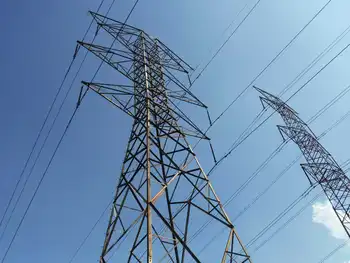Canada falling behind U.S. in clean energy
By National Post
NFPA 70e Training
Our customized live online or in‑person group training can be delivered to your staff at your location.

- Live Online
- 6 hours Instructor-led
- Group Training Available
Although Prime Minister Stephen Harper and his cabinet have stressed the importance of integrating climate-change and energy policy with the United States, industry leaders say the federal government must do more to support sustainable development in Canada.
Two key national programs that promote renewable energy and clean technologies are running out of cash, but officials still don't know whether the government intends to renew their funding.
"One of the key reasons why it's a concern is because this is happening, frankly, at exactly the same time that the United States is moving aggressively to put in place measures to support the deployment of renewable energy," said Robert Hornung, president of the Canadian Wind Energy Association.
"Canada is moving exactly in the other direction, and so what's happening is that gap is widening, and we think that will inevitably lead to investment development leaving Canada and heading for the U.S. instead."
The wind-energy industry is one of the fastest growing sectors in the world. In Canada, while other industries suffered through the economic slowdown, the wind industry set a record in 2009 by introducing 900 megawatts in new wind-energy projects. The total capacity in Canada has risen from 322 megawatts in 2003 to 3,250 megawatts in wind power.
The existing Canadian government ecoENERGY for Renewable Power program offers a guaranteed production incentive for new projects over a 10-year period, but more than 90 per cent of its funding of $1.4 billion has been committed, leaving little incentives for additional projects. By comparison, Mr. Hornung said, the U.S. program has already been extended to 2012 and offers producers nearly three times more support in incentives through a flexible program for domestic or foreign producers.
"It's actually created a situation where, (for) the first time ever, a lot of Canadian companies have the potential to access the U.S. incentive and build projects in the United States, because they can access it now as a capital grant and don't have to have a tax base within the U.S. tax system."
Meanwhile, the head of an arms-length agency, established in 2001, said it will soon need new funding to help sustain growth in new clean-energy technologies. Sustainable Development Technology Canada has already partnered with companies on nearly 200 different projects to offer funding and help raise private capital for new clean-technology products.
Vicky Sharpe, the president and CEO of Sustainable Development Technology Canada, said Canadian companies need federal support in order to compete with their counterparts in the U.S. and Asia.
"Those governments and economies are not only putting large stimulus dollars into having green attached to it, but their markets are demanding green technologies," she said.
"They're demanding more efficiency and greater productivity. So for us in a business perspective, if Canada is going to continue to export successfully, it has to meet this new criteria, and that's all around clean tech."
The organization recently received a $500-million grant to support development of next-generation ethanol production from waste products, but it has almost run out of funding to pursue new climate-change, clean-air, clean-water and clean-soil technologies.
David Vincent, director of projects for Carbon Trust, an arms-length corporation set up by the British government to stimulate investments in low-carbon businesses, said that companies in his country are benefiting from a clear policy direction from the government that has established incentives for projects that reduce emissions.
"It's not necessarily that the guys are any smarter in the UK, but they've actually got a clear direction of travel, which effectively reduces the risk of the investment," said Mr. Vincent during a recent promotional tour of Canada coordinated by the British High Commission.
"In the end, moving to a low-carbon economy is going to have to be done in a partnership. It's going to be a partnership with the policy development on the one hand and the business response and ingenuity on the other."
Natural Resources Minister Lisa Raitt was not available for an interview, but a spokesperson from her department said the government was pleased with the results of Sustainable Development Technology Canada and the ecoENERGY program, which was first established under a different name by the previous Liberal government.
The government has set a goal of having 90 per cent of Canada's electricity provided by non-emitting sources by 2020, up from about 70 per cent today, but has not yet introduced a detailed plan to achieve that goal.
"We are continuing to work with governments, industry, academia and environmental groups to create the enabling environment we need to meet our ambitious goals," said Natural Resources Canada spokeswoman Jacinthe Perras.
About one per cent of Canada's power comes from wind-energy sources, compared to about two per cent in the United States, Mr. Hornung said. But he noted that a recent U.S. government report, requested by former president Bush, concluded that it could raise that proportion to 20 per cent at a cost of about $0.50 per month on the average household's utility bill.











